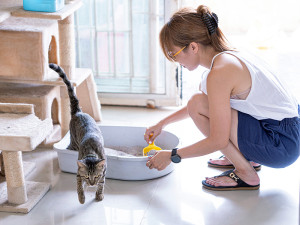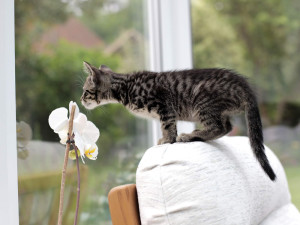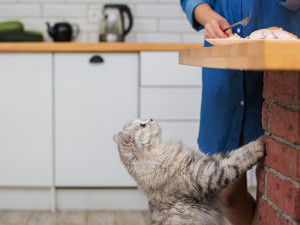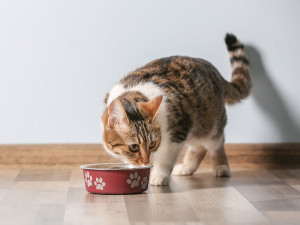Why Do Cats Fart?
Smelly cat, smelly cat, why are you so gassy?

Share Article
In This Article:
Do Cats Fart? Is It Normal For Cats to Fart? Symptoms of Gas In Cats Reasons Why Your Cat Is Farting Are Certain Cat Breeds More Prone to Gas? Is There a Relation Between a Cat’s Age And Farting? When to Be Concerned About a Gassy Cat How to Relieve Your Cat’s Gas How to Manage And Reduce Cat Farts Bottom Line: Cats Can Fart Frequently Asked Questions
Are you ever sitting next to your cat on the couch and suddenly smell a gross odor coming from their direction? Did your kitty seriously just rip one? Learn more about cat farts, what causes them, and what you can do to help reduce their gas (if they are releasing especially noxious fumes).
Do cats fart?
Cats do indeed fart. A fart is nothing more than a buildup of gas in the GI tract that needs to be released. Humans do it, and animals do it, and so do cats. However, cats’ farts are usually silent and less odorous.

Is it normal for cats to fart?
If your cat farts occasionally, that’s normal. Letting out a little gas from time to time is nothing to worry about. However, if your cat excessively farts and also has other symptoms such as lethargy, vomiting, diarrhea, or bloating, that could be a sign of something wrong medically that you need to talk to your vet about.
Symptoms of gas in cats
While occasional farting is normal in a cat, it shouldn’t have other signs accompanying it. The following symptoms could indicate that a vet visit is in order.
Frequent passing of gas
Abdominal bloating
Loud gurgling noises coming from the stomach
Decreased appetite
Discomfort when touched on the belly
Frequent burping
Diarrhea or constipation
If your kitty has any of these symptoms and persistent gas, you should take your cat to the vet.
Reasons why your cat is farting
Diet
Cats are obligate carnivores, a fact that has been known for centuries. Yet, many commercial cat foods have fillers instead of the high-protein ingredients they need, which can lead to digestive problems. Foods that are difficult for cats to digest, such as dairy products, beans, or plants, enhance fermentation in the intestines, leading to gas buildup. A cat’s diet should contain high protein, moderate fat, and low carbohydrates. The protein should be high-quality protein. Unfortunately, many cat diets do not meet these requirements.
Gastrointestinal problems
Cats can have primary intestinal diseases, like people, such as irritable bowel syndrome, inflammatory bowel disease, or bacterial imbalances in the gut. These issues can lead to increased flatulence. These conditions often include other symptoms like diarrhea, vomiting, or weight loss.
Food allergies
Food allergies in cats can lead to excessive gas. If your cat has an allergy to a food, their immune system will react. The reaction is usually to the protein in the food. It could be beef, dairy, fish, or chicken. The immune reaction can lead to inflammation of the intestines, making it difficult to engage in normal digestion.
When the intestines are inflamed, properly breaking down and absorbing nutrients is a struggle. Undigested food can then ferment in the gut, leading to the production of gas. This fermentation process is especially common when food moves too slowly through the digestive system, allowing gut bacteria to break it down in a way that produces excessive gas.
Other signs of food allergies in cats include:
Soft stools or actual diarrhea
Vomiting
Itching around the face and ears
Hair loss or skin irritation
Weight loss or poor coat condition
If you think your cat has a food allergy, you can test it for it through an elimination diet. You first feed a new protein for several weeks instead of the usual. If symptoms improve, you can add back one ingredient at a time to try and find the specific ingredient that is bothering your cat.
Eating habits
Excessive flatulence can result from something as simple as eating too quickly. Eating too quickly can cause increased air intake, which will cause bloating and gas. Multi-cat households often have this problem because the cats compete for food and eat quickly.
Stress
Stress and anxiety can upset a cat’s digestive system, leading to excessive gas. When a cat is stressed, they sometimes over-groom, eat too quickly, or develop an upset stomach. Any of these behaviors can increase flatulence.
Parasites
Intestinal parasites can lead to increased flatulence. Worms or giardia can upset the GI tract, leading to excessive gas. If your cat has persistent diarrhea, bloating, weight loss, and gas, a vet check-up is essential to rule out parasites.
Are certain cat breeds more prone to gas?
Any cat can develop excessive gas, but some breeds suffer more than others. Persians and Exotic Shorthairs have unique skull structures, which can result in excessive air intake while eating, which can lead to increased flatulence. In addition, breeds with sensitive stomachs, like the Siamese, may have digestive issues that lead to excessive gas.
Is there a relation between a cat’s age and farting?
Yes, there can be. As kittens transition to solid food, they may develop temporary gas as their digestive systems adjust. Seniors may also have increased farting. They often develop digestive sensitivities from decreased digestive enzyme production or health issues like kidney disease, hyperthyroidism, or diabetes.
When to be concerned about a gassy cat
Since it is rare to smell or hear farting in a cat, when it happens, it is probably excessive. You should do some investigation. Primarily, you’ll want to look for:
Persistent bloating or abdominal discomfort
Frequent diarrhea or constipation
Vomiting
Lethargy
Loss of appetite
Excessive drooling
These symptoms could indicate more serious conditions, such as gastrointestinal infections, food allergies, or even organ dysfunction. A veterinary evaluation is recommended in these cases.
How to relieve your cat’s gas
If your cat seems uncomfortable due to gas, consider these strategies:
Adjust their diet: Feed a high-protein, quality protein, and balanced diet. Avoid fillers or dairy.
Encourage slow eating: Try food puzzles or slow feeder bowls to slow down eating so gulping air is prevented while eating.
Reduce stress: Provide a calm and stable environment, as stress can contribute to digestive issues.
Ensure parasite prevention: Take your cat to the vet regularly for exams and fecal tests. Ask your vet how often your cat should be dewormed.
Consult a vet: If dietary changes don’t help, seek professional advice to rule out medical conditions.
As cats age, it is a good idea for them to have blood work. That is the only way you will know if your cat has diabetes, hyperthyroidism, or kidney disease.
How to manage and reduce cat farts
Choose the right cat food.
Feeding your cat a balanced, high-quality diet with limited fillers can significantly reduce gas. Consider novel protein diets if your cat has food sensitivities.
Encourage slow eating.
Cats who eat too fast swallow excess air, leading to bloating and gas. Using slow feeders, food puzzles, or offering smaller meals throughout the day can help prevent this.
Reduce stress.
A calm environment with proper enrichment, such as scratching posts, hiding spots, and interactive playtime, can minimize stress-induced digestive problems.
Visit the vet.
If your cat’s gas persists despite dietary and lifestyle changes, consult your vet to rule out underlying health conditions, such as parasites or allergies.
Bottom line
Yes, cats fart, but they usually do so quietly and without much odor. Occasional gas is normal, but excessive or foul-smelling flatulence could indicate an issue with diet, digestion, or underlying health conditions. By monitoring your cat’s diet and health, you can help keep their digestive system running smoothly.
FAQs
Do cat farts smell?
Cat farts can have a faint odor, not nearly as strong as people or dogs. If they suddenly become more intense in odor, something could be going on with your cat’s intestinal tract. You should schedule an exam with your vet if there are other symptoms.
Why do my cat’s farts smell so bad?
It is not normal for your cat’s farts to smell badly. A faint odor is all you usually smell. Strong-smelling odors often indicate something going on with the digestive tract, the food your cat eats, food allergies, a low-quality diet, or a medical condition. It would be best if you see your veterinarian.
How often do cats fart in a day?
There’s no definite number. You usually do not hear or smell anything, so it’s impossible to count. If you suddenly notice the odor or sound of a fart frequently, it’s probably too often. A vet check-up is in order.
Do cats fart out loud?
Cats usually fart silently. Their small digestive systems produce less gas compared to dogs, making loud farts uncommon.
How come I never hear my cat fart?
Cat farts are usually quiet because they produce less gas and have tighter anal sphincter control than dogs. While silent, they still happen; you may only notice them if there’s an accompanying odor.
References
Ellis, Sarah LH. “Environmental Enrichment: Practical Strategies for Improving Feline Welfare.” Journal of Feline Medicine and Surgery, vol. 11, no. 11, Nov. 2009, pp. 901–912, journals.sagepub.com/doi/full/10.1016/j.jfms.2009.09.011, https://doi.org/10.1016/j.jfms.2009.09.011opens in new tab.
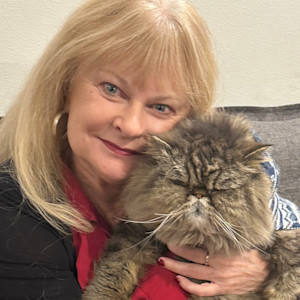
Dr. Shelby Neely, DVM
Dr. Shelby Neely is a freelance writer and veterinarian who graduated from the University of Pennsylvania School of Veterinary Medicine and has practiced veterinary medicine for 30 years, specializing in small animals. Her work has appeared in Allivet, AsktheCatDoctor, WhiskerDocs, Ask the Cat Doctor Radio, Ask the Cat Doctor TV, and numerous other websites, brochures, newsletters, newspapers, and ebooks. In her spare time, Dr. Neely likes to spend time with her three children, two grandchildren, three cats, two grand-cats, and five grand-dogs.
Related articles
Are Sunflowers Toxic to My Cat?
You’ve gotta love sunflower season—here’s why your cat can, too.
![Half-bengal kitten indoors smelling white orchid flowers in a conservatory.]()
Are Orchids Toxic to Cats?
Find out whether you can get that elaborate flower arrangement—or if you should skip it.
Why Does My Cat Throw Up After Eating?
That doesn’t seem normal...
![Cat asking for human food from counter]()
What Can Cats Eat Besides Cat Food?
Good news for your begging cat: Some of your favorite snacks are safe to share.
Can Cats Drink Milk?
The movies would have you believe they can.
![cat eating sensitive stomach food for cats]()
Do Cat Foods For Sensitive Stomachs Really Help?
Dr. Bruce Kornreich explains why going this route isn’t always the answer.


